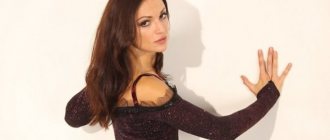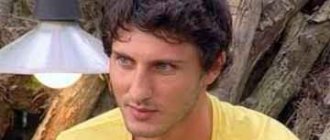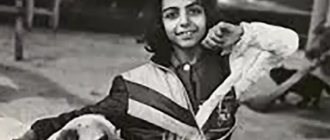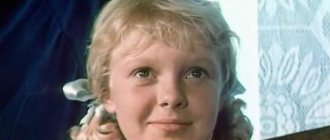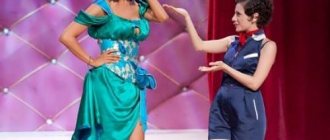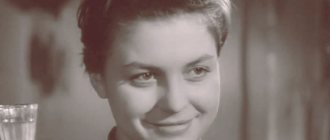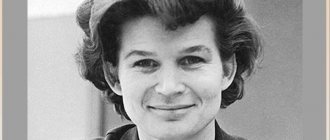| Margarita Levieva | |
| Margarita Levieva | |
Levieva in 2009 | |
| Birth name: | Margarita Vladimirovna Levieva |
| Place of Birth: | Leningrad, RSFSR, USSR |
| Profession: | actress, gymnast |
| Career: | 2004 - present time |
Margarita Vladimirovna Levieva
(English:
Margarita Levieva
; born February 9, 1980, Leningrad, RSFSR, USSR) is an American actress, formerly a professional gymnast[1]. She is best known for her roles in films such as The Invisible (2007), The Womanizer (2009) and Parkland (2009), and for her role as Amanda Clarke/the real Emily Thorne on the ABC primetime soap opera "Revenge" (2011-2013).
early years
Margarita Vladimirovna[2] Levieva was born in Leningrad into a Jewish family[3][4][5]. Both of her grandmothers, as children, survived the siege of Leningrad. She started doing rhythmic gymnastics at the age of three. At the age of eleven (1991), she emigrated with her mother and twin brother Mikhail (Michael) to the United States, where she settled in the Sheepshead Bay area of Brooklyn[6]. She attended high school in Sicaucus, New Jersey. Graduated from the Faculty of Economics of New York University. A growing interest in acting led Levieva to the William Esper Studio.
).
Biography and personal life
Margarita and her twin brother were raised in an intelligent, wealthy family of hereditary Jews.
To direct the energy of the nimble, restless girl in the right direction, the parents enrolled their 3-year-old daughter in the rhythmic gymnastics sports section. Daily, grueling training instilled in Levieva discipline and endurance, which was useful to her in the future. In 1991, Margarita’s mother decided to move to America for permanent residence. They stayed in Sheepshead Bay, Brooklyn, but the children attended school in Sicaucus. After graduation, Levieva entered one of the universities in New York, where she studied the basics of economics.
The creative nature of the beautiful and elegant Russian woman was eager for a more sublime, exciting type of activity than numbers. So, Margarita became a student at the William Esper School of Acting. It was there that she felt in her place and did not regret her choice.
Career
In 2005, Levieva appeared in the television series “Law and Order. Jury trial". That same year, New York Magazine
included Levieva in the list of the 50 most beautiful people in New York[7]. She then starred in the short-lived television series Lost in 2006.
In 2007, Levieva played the main role in the film “The Invisible”, and then appeared in several more independent films, such as “Noise” with Tim Robbins and William Hurt. In 2009, she starred in the comedy “Recreation Park”, as well as in the drama “Womanizer” with Ashton Kutcher. That same year she performed in the theater play The Retributionists
[8].
On television, Levieva appeared in the HBO series “How to Succeed in America” in 2010-2011. In 2011, she starred in The Lincoln Lawyer with Matthew McConaughey. She also starred in the films The Stand Up
,
Knights of Badassdom
,
For Ellen
and
Loft
.
From 2011 to 2013, Levieva played the role of Amanda Clarke/Emily Thorne in the ABC television series Revenge.[9] In 2014, Levieva was invited to one of the main roles in the NBC series Allegiance, where she starred alongside Hope Davis[10]. The show was canceled after just a few episodes. She then landed a starring role in the HBO series The Deuce.
[11].
Personal life of Margarita Levieva
Levieva's private life is a secret behind seven seals. It is known about her affairs with her acting colleagues - with Canadian Justin Chastwin in 2007 and Romanian Sebastian Stan (they dated from 2014 to 2020).
Margarita Levieva and Sebastian Stan dated for three years
The actress herself prefers to evasively refer to her constant employment, which prevents her from building strong romantic relationships with men.
Filmography
Movies
| Year | Title in Russian | Title in English | Role | Notes |
| 2004 | Billy's Choice | Billy's Choice | Julie Romano | Short film |
| 2005 | English | English | Stephanie Davis | |
| 2007 | David's apartment | David's Apartment | DiDi | |
| 2007 | Invisible | The Invisible | Annie Newton | |
| 2007 | Noise | Noise | Ekaterina Filippovna | |
| 2009 | Womanizer | Spread | Heather | |
| 2009 | Park of Culture and Recreation | Adventureland | Lisa P | |
| 2010 | The Stand Up | Julie | ||
| 2011 | Lincoln for a lawyer | The Lincoln Lawyer | Regina Campo | |
| 2012 | For Ellen | Clare | ||
| 2013 | Knights of the Kingdom of Cool | Knights of Badassdom | Beth | |
| 2013 | Sweetening in the Night | Diana | Short film | |
| 2014 | Express: Moscow - Russia | Mila Seminov | Russian film | |
| 2014 | Loft | Loft | Vicki | |
| 2015 | Diary of a Teenage Girl | The Diary of a Teenage Girl | Tabata |
A television
| Year | Title in Russian | Title in English | Role | Notes |
| 2005 | Law & Order: Trial by Jury | Law & Order: Trial by Jury | Stephanie Davis | 1 episode |
| 2005 | New York-70 | NY-70 | Cindy | Pilot |
| 2006 | Prince | The Prince | Isabelle | Pilot |
| 2006 | Missing | Vanished | Marcy Lollins | 13 episodes |
| 2006 | What is not made for love? | What's Not to Love? | Blake | Pilot |
| 2009 | Kings | Kings | Claudia | 1 episode |
| 2010—2011 | How to succeed in America | How to Make It in America | Julie | 6 episodes |
| 2011—2013 | Revenge | Revenge | The real Emily Thorne/Amanda Clarke | 24 episodes |
| 2013-2016 | Black list | The Blacklist | Gina Zanetakos | 4 episodes |
| 2015 | Loyalty | Allegiance | Natalie O'Connor | 13 episodes |
| 2015 | The Deuce | Abby Parker | 10 episodes |
Notes
- [www.margarita-levieva.com/bio.php/ Margarita Levieva]
- [www.nevidimiy.ru/margarita-levieva/ “Invisible”]
- [www.vulture.com/2009/09/margarita_levieva.html Lori Fradkin “The Retributionists' Margarita Levieva on Jewish Revenge and Being Lisa P.”]
- Axelrod, Nick
. [www.wwd.com/lifestyle-news/eye/tilt-a-whirl-girl-margarita-levieva-in-adventureland-2089463?justin=2089463 Tilt-A-Whirl Girl: Margarita Levieva in 'Adventureland'], WWD Lifestyle (April 2, 2009). Retrieved April 3, 2009. - [nypost.com/2012/11/04/female-trouble/ Mary Murphy “Female trouble”]
- [articles.latimes.com/2007/apr/29/entertainment/ca-levieva29 She's anything but 'Invisible']
- [www.margarita-levieva.com/bio.php Biography of the actress on the website Margarita-Levieva.com] (English)
- Fradkin, Lori
. [nymag.com/daily/entertainment/2009/09/margarita_levieva.html The Retributionists' Margarita Levieva on Jewish Revenge and Being Lisa P.], New York Magazine (September 14, 2009). Retrieved September 15, 2009. - Masters, Megan
.
[www.tvline.com/2011/11/revenge-season-1-margarita-levieva/ Revenge Preview: The Real Emily Thorne Reveals Her Agenda! (Hint: It Involves 'Sharing')], TVLine
(November 16, 2011). Retrieved November 17, 2011. - Nellie Andreeva.
[www.deadline.com/2014/02/hope-davis-margarita-levieva-nbc-drama-pilot-coercion/ Hope Davis & Margarita Levieva To Star In NBC Drama Pilot 'Coercion'].
Deadline.com
(February 24, 2014). Retrieved May 17, 2014. - [deadline.com/2015/10/margarita-levieva-star-the-deuce-hbo-pilot-lawrence-gilliard-dominique-fishback-1201564820/ Margarita Levieva To Star In HBO Drama Pilot 'The Deuce'; Two Others Cast].
- Sierra Marquina.
[www.usmagazine.com/celebrity-news/news/sebastian-stan-and-margarita-levieva-are-dating-2014317 New Couple! Sebastian Stan, Margarita Levieva Are Dating]. Us Weekly (July 31, 2014). Retrieved August 31, 2020.
Margarita Levieva now
Now the girl not only acts in films, but also plays in the theater, improving her own skills of transformation.
Margarita Levieva in 2020
Margarita Levieva has not yet talked about the films, the shooting of which is scheduled for 2018, but fans can follow news about the actress’s life and plans on her page on the social network Instagram.
An excerpt characterizing Leviev, Margarita Vladimirovna
“Sonya,” said the Countess, raising her head from the letter as her niece walked past her. – Sonya, won’t you write to Nikolenka? - said the countess in a quiet, trembling voice, and in the look of her tired eyes, looking through glasses, Sonya read everything that the countess understood in these words. This look expressed pleading, fear of refusal, shame for having to ask, and readiness for irreconcilable hatred in case of refusal. Sonya went up to the countess and, kneeling down, kissed her hand. “I’ll write, maman,” she said. Sonya was softened, excited and touched by everything that happened that day, especially by the mysterious performance of fortune-telling that she just saw. Now that she knew that on the occasion of the renewal of Natasha’s relationship with Prince Andrei, Nikolai could not marry Princess Marya, she joyfully felt the return of that mood of self-sacrifice in which she loved and was accustomed to living. And with tears in her eyes and with the joy of realizing a generous deed, she, interrupted several times by tears that clouded her velvety black eyes, wrote that touching letter, the receipt of which so amazed Nikolai. At the guardhouse where Pierre was taken, the officer and soldiers who took him treated him with hostility, but at the same time with respect. One could still feel in their attitude towards him doubt about who he was (whether he was a very important person), and hostility due to their still fresh personal struggle with him. But when, on the morning of another day, the shift came, Pierre felt that for the new guard - for the officers and soldiers - it no longer had the meaning that it had for those who took him. And indeed, in this big, fat man in a peasant’s caftan, the guards of the next day no longer saw that living man who so desperately fought with the marauder and with the escort soldiers and said a solemn phrase about saving the child, but saw only the seventeenth of those being held for some reason, by by order of the highest authorities, the captured Russians. If there was anything special about Pierre, it was only his timid, intently thoughtful appearance and the French language, in which, surprisingly for the French, he spoke well. Despite the fact that on the same day Pierre was connected with other suspected suspects, since the separate room he occupied was needed by an officer. All the Russians kept with Pierre were people of the lowest rank. And all of them, recognizing Pierre as a master, shunned him, especially since he spoke French. Pierre heard with sadness the ridicule of himself. The next evening, Pierre learned that all of these prisoners (and probably himself included) were to be tried for arson. On the third day, Pierre was taken with others to a house where a French general with a white mustache, two colonels and other Frenchmen with scarves on their hands were sitting. Pierre, along with others, was asked questions about who he was with the precision and certainty with which defendants are usually treated, supposedly exceeding human weaknesses. where he was? for what purpose? etc. These questions, leaving aside the essence of the life matter and excluding the possibility of revealing this essence, like all questions asked in courts, had the goal only of setting up the groove along which the judges wanted the defendant’s answers to flow and lead him to the desired goal, that is, to the accusation. As soon as he began to say something that did not satisfy the purpose of the accusation, they took a groove, and the water could flow wherever it wanted. In addition, Pierre experienced the same thing that a defendant experiences in all courts: bewilderment as to why all these questions were asked of him. He felt that this trick of inserting a groove was used only out of condescension or, as it were, out of politeness. He knew that he was in the power of these people, that only power had brought him here, that only power gave them the right to demand answers to questions, that the only purpose of this meeting was to accuse him. And therefore, since there was power and there was a desire to accuse, there was no need for the trick of questions and trial. It was obvious that all answers had to lead to guilt. When asked what he was doing when they took him, Pierre answered with some tragedy that he was carrying a child to his parents, qu'il avait sauve des flammes [whom he saved from the flames]. – Why did he fight with the marauder? Pierre replied that he was defending a woman, that protecting an insulted woman is the duty of every person, that... He was stopped: this was not getting to the point. Why was he in the yard of the house on fire, where witnesses saw him? He replied that he was going to see what was happening in Moscow. They stopped him again: they didn’t ask him where he was going, but why was he near the fire? Who is he? They repeated the first question to him, to which he said that he did not want to answer. Again he replied that he could not say that. - Write it down, this is not good. “It’s very bad,” the general with a white mustache and a red, ruddy face told him sternly. On the fourth day, fires started on Zubovsky Val. Pierre and thirteen others were taken to Krymsky Brod, to the carriage house of a merchant's house. Walking through the streets, Pierre was choking from the smoke, which seemed to be standing over the entire city. Fires were visible from different directions. Pierre did not yet understand the significance of the burning of Moscow and looked at these fires with horror. Pierre stayed in the carriage house of a house near the Crimean Brod for four more days, and during these days he learned from the conversation of the French soldiers that everyone kept here expected the marshal's decision every day. Which marshal, Pierre could not find out from the soldiers. For the soldier, obviously, the marshal seemed to be the highest and somewhat mysterious link in power. These first days, until September 8th, the day on which the prisoners were taken for secondary interrogation, were the most difficult for Pierre. On September 8th, a very important officer entered the barn to see the prisoners, judging by the respect with which the guards treated him. This officer, probably a staff officer, with a list in his hands, made a roll call of all the Russians, naming Pierre: celui qui n'avoue pas son nom [the one who does not say his name]. And, looking indifferently and lazily at all the prisoners, he ordered the guard officer to dress them decently and tidy them up before leading them to the marshal. An hour later, a company of soldiers arrived, and Pierre and thirteen others were taken to the Maiden Field. The day was clear, sunny after the rain, and the air was unusually clean. Smoke did not settle down like on the day when Pierre was taken out of the guardhouse at Zubovsky Val; smoke rose in columns in the clear air. The flames of the fires were nowhere to be seen, but columns of smoke rose from all sides, and all of Moscow, everything that Pierre could see, was one conflagration. On all sides one could see vacant lots with stoves and chimneys and occasionally the charred walls of stone houses. Pierre looked closely at the fires and did not recognize familiar quarters of the city. In some places, surviving churches could be seen. The Kremlin, undestroyed, loomed white from afar with its towers and Ivan the Great. Nearby, the dome of the Novodevichy Convent glittered merrily, and the bell of the Gospel was especially loudly heard from there. This announcement reminded Pierre that it was Sunday and the feast of the Nativity of the Virgin Mary. But it seemed that there was no one to celebrate this holiday: everywhere there was devastation from the fire, and from the Russian people there were only occasionally ragged, frightened people who hid at the sight of the French.
